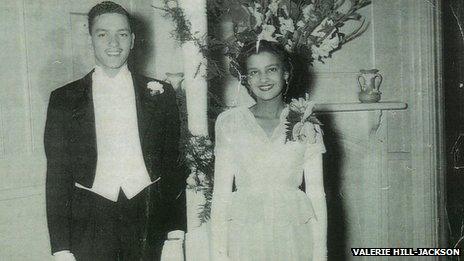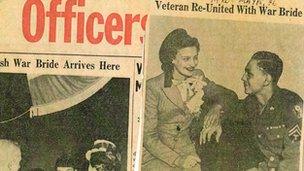Love stories of Tiger Bay brides and American GIs told
- Published

The documentary says around 100 women left Tiger Bay to marry their GIs
The story of white American GIs billeted in Wales and the sweethearts they took home after WWII has been well documented over the years.
Yet such was the racism which black soldiers were subject to during the war that much less is known about the hundred or so Tiger Bay girls who left Cardiff for the love of those men.
In fact the multicultural nature of the area around the city's docklands gained such a reputation amongst black GIs that Tiger Bay continued to be a romantic Mecca for those serving throughout Europe right up until the 1980s.
Now for the first time their stories have been gathered for a documentary by American scholar Dr Valerie Hill-Jackson, whose own mother-in-law set sail from Tiger Bay for Texas in the late 1940s.
"It's remarkable that any of the Tiger Bay marriages ever developed in the first place because the US Army did not leave its segregationist policies at home when black GIs were brought to Britain.
"They were separated from their white counterparts, held in a base at Lavernock Point in the Vale of Glamorgan, and banned from mixing with the general public; Tiger Bay being particularly out-of-bounds.
"Part of this was so that the Welsh public wouldn't get a chance to see how the black soldiers were treated in comparison to the white, and partly so that the GIs themselves wouldn't take home ideas of civil liberties picked up from their experiences of the openness and multiculturalism of the docks."
But love will find a way, and soon after their arrival black GIs were being ferried into Tiger Bay by local people via brewery dray trucks, in the footwells of taxis, and even smuggled beneath coal on barges along the Glamorganshire Canal.
Dr Hill-Jackson, who spent a year interviewing GI brides and local historians, explains that whilst there was a financial motivation behind smuggling the GIs into Cardiff, the two communities forged great cultural links.
Prejudice and segregation
"The soldiers who visited Tiger Bay were seemingly very generous with their gum, hams, chocolate and nylons, so of course they were welcome visitors," she said.
"But much more than that, whilst the idea of flings with foreign soldiers would have been unthinkable elsewhere in Wales, it seemed much more acceptable in Tiger Bay, as most of the girls themselves came from a rich ethnic melting pot of Welsh and Irish mothers and Egyptian and Somali sailor fathers."

A newspaper clipping of Dr Hill-Jackson's in-laws, Patti Ann Ismail and Bowen Keiffer Jackson Sr
It set a pattern which would persist until the withdrawal of American troops from Europe in the 1980s.
But of around a hundred women who left Wales, many were to return, their dreams shattered.
"You might think that Britain was racist during the 40s and 50s, but it was nothing compared to the prejudice and segregation which awaited these Welsh girls in the Southern States," said Dr Hill-Jackson.
"A few spoke out, like my mother-in-law who used her experience of the equality of Tiger Bay to become a leading voice in the NAACP [National Association for the Advancement of Colored People].
"But many more saw their marriages crumble beneath their frustration and homesickness."
The documentary - Tiger Brides: Memories of Love and War from GI Brides from Tiger Bay - will be shown on Saturday night at Butetown Community Centre, Cardiff.